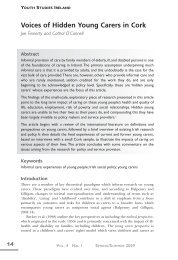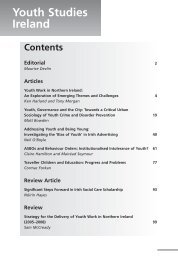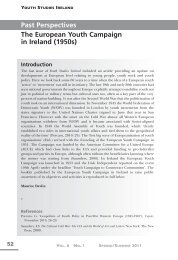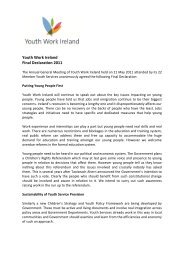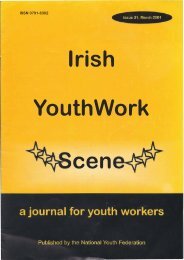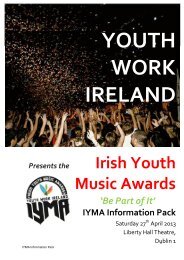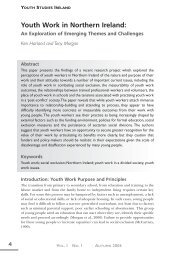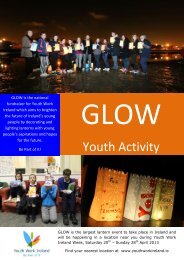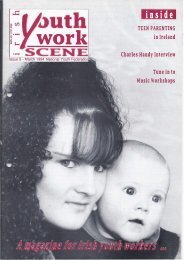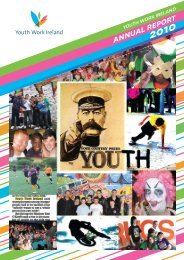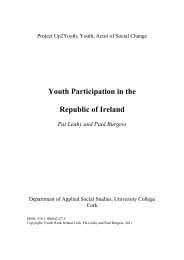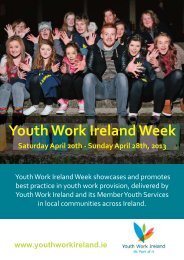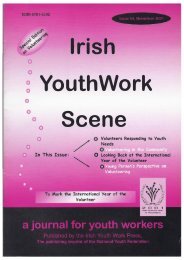Issue 25: May 1999 - Youth Work Ireland
Issue 25: May 1999 - Youth Work Ireland
Issue 25: May 1999 - Youth Work Ireland
Create successful ePaper yourself
Turn your PDF publications into a flip-book with our unique Google optimized e-Paper software.
Yet as, Dunphy points out, youth workers are:"expected to work in catchment areas that areoften vast, and they are, to use a cliche,ridiculously overworked and understaffed.They are often paid at the same level asunskilled workers"It is the young people in the communities in whichwe work who suffer, and will continue to suffer,unless this situation changes. It is only we youthworkers who, by organising ourselves, andworking in partnership with the youth workagencies, can change this situation. Nobody elsewill do it for us.quality of the work that is done and the nature oftraining and qualification. We want to work inpartnership with the employers to fight for moreresources and better legislation to support youthand community services. Like all Unions we areonly as good as our membership. We believe youhave a lot to offer us in return for the benefits yougain from being part of a Trade Union. CYWU isa democratic organisation and it is good funbeing an active member.Membership is open to all youth workers, youthofficers, community workers, community artsworkers, playworkers, etc whether student,volunteer, part-time or full-time.Community and <strong>Youth</strong> <strong>Work</strong>ers UnionThere has been a specialist trade union for <strong>Youth</strong>and Community <strong>Work</strong>ers operating in the UK forover 68 years that understand the needs of faceto face workers. The Community and <strong>Youth</strong><strong>Work</strong>ers Union will work to protect the essentialservices for young people and their communitiesthat we provide. By raising the profile of the workthat members do we can put up a better fight forthe level of investment required to ensure that theyouth service is no longer the Cinderella of theEducation system.We look forward to having you in membership.For further information about joining CYWUcontact: Sean Gibbons through NationalOffice on 0044 - 121 - 244 3344 or by Email on sgibbons@tinet.ie.Sean Gibbons is a worker with aCommunity Development Project inBohermore, Galway.The Northern <strong>Ireland</strong> region has recently beenreactivated and a new branch of the Union hasbeen set up in Galway. <strong>Youth</strong> workers in theRepublic can, by joining the CYWU, avail of theexpertise of the Union to improve the terms andconditions of youth and community workers. Webelieve that the valuable work that youth andcommunity workers do needs to be properlyrewarded by employers in terms of pay. We thinkall volunteers, part-time workers and full-timeworkers in the <strong>Youth</strong> Service deserve excellenceand equality of treatment at work. We should allbe treated professionally and fairly. Sadly, toomany of us know from bitter personal experiencethat this is not always the case.ConclusionBut it is not all about terms and conditions. As aUnion made up of dedicated youth andcommunity workers we also care about theIRISH YOUTHWORK SCENE 4
Unionisation: <strong>Issue</strong>s For<strong>Youth</strong> and Community<strong>Work</strong>ersby Martin Geogheganbeing paid £1 3,000 1 - which undervalues themand their work in a dramatic way, and iscompletely unacceptable. However, for a unionto be successful, it needs the full support of thesector - and at the moment, why wouldsomeone on £29,000 support radical action onbehalf of poorer paid workers they probablydon't know or, frankly, even care about?Especially when it might effect their ownposition?IntroductionThis article looks at the issue of unionisation foryouth and community workers, questioning some ofthe things that we take for granted about beingunionised, and points out ·some advantages anddisadvantages of unionising.We need a union - don't we?In another article in this edition, Sean Gibbons writesabout establishing a union for youth and communityworkers in <strong>Ireland</strong>. At first glance this would beappear to be, as American sit-corns are wont to say,a "no brainer" - that is something so obviously rightthat it doesn't merit questioning. When we think ofour experiences as youth and community workers [Ishould point out that I was a community worker, andI now work for a <strong>Youth</strong> Service - but as aninformation officer and not a youth worker] we arepainfully aware of the enormous workload, thepressures and the often poor wages and conditions.When we think of these problems it seems onlynatural that we should band together to fight forbetter terms and conditions. Simple, isn't it?Unionised against who?However, the situation is not quite as straightforwardas we might initially suspect. There are severalissues that complicate matters: first, if we limitourselves to thinking about wages and conditionsthen I would suggest that any attempt at unionising isdoomed because it assumes that we are all in poorlypaid jobs and that we'll all band together to right thiswrong. This simply isn't true [and it also assumesthat we are all sympathetic to unions]. I don't wantto personalise this article by pointing out exactexamples, but some <strong>Youth</strong> Services [particularlythose with a statutory base, or closely linked] areadequately rewarded for their work. Anybody whokeeps an eye on the jobs' pages of the nationalpress will know that only in the past month therehave been well paid youth and community work jobsadvertised - some with salaries up to £29,000. Nowcompared to the software industry this is smallpotatoes, but compared to most jobs this is actuallyquite good. I should also point out that this figurewasn't even for a director position. Now, theopposite is also the case - I know of full-time youthworkers with over a decade of experience who areOften, it is not poor pay that is the main issue, but isthe disparity between different workers' pay andconditions that cause the most strain. For examplenew workers on new projects are sometimes gettingsalaries 30% higher than people doing equivalentjobs in the same organisation who have a decade ormore experience, based purely on the timing of theapplication for funds [as a general rule, new projectsare better funded than ones that began in theeighties]. This is damaging for morale, and makes amockery of youth work's stance on young peoples'rights and entitlements, as it doesn't even model thiswith its own staff.Another issue is that the majority of <strong>Youth</strong> Servicesare, in effect, contracted by the Department ofEducation and Science [or Department of Justice foryouth diversion projects] to carry out specific piecesof work. This contract model is further strengthenedwithin the 1998 <strong>Youth</strong> <strong>Work</strong> Act. Community work isin much the same position [but probably even moreprecariously positioned], being particularly true of theDepartment of Social, Community and Family Affairsfunded Community Development Projects. Whatthis means is that if you unionise in order to increasewages and improve conditions, then it is your <strong>Youth</strong>Service or community group against which you wouldbe confronting, as they are your employer. If pushcame to shove and you actually went on strike, thenit is your community or organisation that you will beengaging with. The relevant governmentDepartments will inevitably say that any issue aroundpay is for the holders of the contract to sort out, andnot a matter for them - Department officials havealready made this point on many occasions.Now, you might argue that if your organisation paysyou that poorly then they deserve what they get - butmany youth and community organisations would liketo pay their staff more, but can't get more money outof central government. It's a vicious circle thatneatly allows central government to escape from thedebate, and places the conflict between the workerand the group they work fo r.1 Given the obvious and dramatic differences in payfor the same job depending on which organisationyou work for, it might make sense for nationalresearch to be carried out as to what exactly thecase is in relation to pay and conditions. [I'm gratefulto another for pointing this out to me.]5MAY <strong>1999</strong>
The real issueWhat I'm actually arguing is that the problem is notreally around pay or conditions really - but ratheraround a lack of recognition for the work. If you wantto pursue better conditions for all youth and communityworkers then the challenge is to change the culture ofcentral government to actually value the work - or evenbetter, challenge society's understanding that youthand community work is "normal". Most people seemto feel that the existence of such projects is a naturaland everyday thing, but this underlines the casualnature with which poverty and social exclusion areaccepted.An example of the extent to which the work is not trulyvalued is that youth work is often referred to as the"non-formal education sector", however there is no waythat it has parity of esteem with the formal educationsector within the Department of Education andScience. If it did, we would all be in permanent,pensionable, well-paid, salary-scaled jobs. We're not,and I doubt we ever will be. It is a very similarsituation for community workers - many of whom canrecount experiences of the marginalised nature of theirwork.There is even a sizeable number of youth andcommunity workers who feel uncomfortable aboutdeveloping any further links with central government -even if it means an increase in pay - because they seehuge divisions in our society, and how centralgovernment often facilitates these divisions. Thisarticle is too short to go into this argument in detail butsimply put, the closer youth and community workersare linked to central government then the more like civilservants they are likely to become, and this brings withit problems about openly disagreeing with governmentpolicy.Networking and UnionisingSome of this [all of this?] may be pie in the sky, but inthe <strong>Ireland</strong> of today with its ever widening gap betweenthe rich and those living in poverty, it is a time forincreased solidarity. By all means, let's have a union -but let's make it one that cuts across sectors to includeall those that can contribute to changing society, andnot one that by focusing on our position in the system'sfood chain actually divides us into artificial sectorscalled "youth", "community", "human rights" orwhatever.Successful networking could also provide alternativeways of improving pay and conditions. For instancewe could work with the management and board of ourand other organisations and our national umbrellaorganisations [e.g. the National <strong>Youth</strong> Federation, theCommunity <strong>Work</strong>ers' Co-op etc.] about negotiatingincreased funding out of which a better package canbe put together.A further advantage of unionising is that it might offe ropportunities for all of us involved in this type of work tothink about issues that currently aren't being fullyaddressed. Some that spring to mind are the differencein roles between paid and voluntary activists, theprofessionalisation of youth and community work [andwhether this is a useful development], the allocation offunds, and the development of ourselves and ourorganisations.And finallyI am often accused of taking things too seriously, andmaybe this article bears this out. But I do believe verystrongly in looking before you leap, and hence thislongwinded article on an issue that most people arelikely to think is just a good idea. I could sum thewhole thing up in a few sentences [and, I hear you say,maybe I should have!]:• let's work out what the underlying issues areSo far you would be forgiven for thinking that I'magainst unionising - actually nothing could be fartherfrom the truth. I'm actually all for it, but it needs tohave a wider agenda than just pay and conditions.What might be useful is a different idea aboutunity ... something new and invigorating ... What if wenetworked with others on the basis of a sharedunderstanding of social exclusion? Not only would thismeet a need that is going unmet at the moment, butwould open up all sorts of exciting possibilities likelinking the youth and community sectors [althoughthere is some crossover, it is quite minimal]. Thiscoalition could be expanded to groups that share ourconcerns about the structure of society such as groupsthat fight for women's rights, gay and lesbian rights, onenvironmental issues , on racial discrimination - in shortwe unionise and network on the basis of a sharedvision - and not on narrow instrumental concernsaround pay and conditions. Imagine that type of union!• let's think critically about who we should be inunion with and - crucially - against• let's think creatively about how we look afterour own financial welfare• let's identify other groups that we can makestrategic alliances with, so that we can addressour own issues and the wider societal issuesthat we deal with at one and the same timeMartin Geoghegan is the <strong>Youth</strong> InformationCo-ordinator with the Waterford Regional<strong>Youth</strong> ServiceIRISH YOUTHWORK SCENE 6
The Lunch-Time HelpersSchemephysical fight, formation of 'gangs'leading to conflict and exclusion ofcertain children who are told allowed tojoin in, victimisation of a particular child.by Mary Sheehy • Tale-telling after lunchtime.• Children standing against the wall."If a child has a bad experience in the yard atlunch time; he/she returns to class and is unableto learn for the rest of the day".IntroductionLunchtime can seem a long time to a youngchild if there is nothing to do or no one to playwith. Some children get bored with little tooccupy or stimulate them for up to 30 minutesand it is not surprising that this can lead toarguments, kicking and fighting or to childrenbeing isolated with no one to play with. A"Lunch Time helpers Scheme" has recentlybeen introduced to many primary schools in theNorth - West area of Cork City.• Queues outside the head-teacher's office.• Lunchtime supervisors frequently shouting atchildren.• General apathy amongst lunchtimesupervisors about playing games withchildren in the playground• Lunchtime supervisors feeling resentfulbecause of inconsistencies between playtimeand lunchtime standards of behaviour.• Wet playtimes being barely manageable forthe lunchtime supervisors• Occasional complaints from parentsRecruitment and TrainingThe scheme involves lunchtime helpersorganising a variety of games and activities forother children in the yard at lunch time. A youthworker and a designated teacher recruitvolunteers from fifth and sixth class to be thehelpers. The potential volunteers fill inapplication forms to become a lunchtime helperand are then interviewed.A group of approximately eight to ten volunteerstake part in a training programme, which coverstopics amongst others such as;• Friendship• Bullying• Team <strong>Work</strong>• The role of the lunchtime helper• How to organise games.Guidelines for Lunchtime Helpers• Treat All Children Fairly and EquallyIt is all too easy to jump to wrong conclusionsabout a situation. The children must be givenan opportunity to explain their behaviour. Don'tact on hearsay, only act on what you are sureyou saw.• Be Friendly and ApproachableChildren need see you as someone who isapproachable and ready to listen to them. Acold or distant manner will stop them fromapproaching you.• Give Gentle remindersChildren often simply forget some rules eg.running in the corridor. A gentle reminder isoften all that is needed to correct this.Developing a Lunchtime Policy Checklist(checking for problems occurring in yourschool during the lunchtime period)• Bad behaviour, eg. Lots of kicking or spoilingof each other's games.• Bullying from individual children to otherchildren ranging from verbal threat to• Stay CalmTry to stay calm at all times. This will help youto remain in authority and be effective.• SmileTry end remember to smile at the children, theywill then see you as someone warm andfriendly.7MAY <strong>1999</strong>
• Try and ChatBe willing to chat to the children about their news,interests and activities.• Give PraisePraise is more effective than criticism so try anduse praise frequently.• Give IncentivesAsk the school if there are any special stickers orincentives that you could use.• Be FairBe fair with whatever punishment system is inuse. If you didn't spot the trouble don't rely onthe word of other children - take time to talk itthrough but look out for it deliberately.• Be PoliteSet a good example to the children by speakingpolitely to them. Ask girls as well as boys to dothe heavy jobs.• Avoid Getting into a ConfrontationDon't argue with a child, this undermines yourauthority. Repeat your request calmly, then useyour sanctions system• Help a Child 'Back Out' of an AwkwardSituationIf a child is deliberately rude ask them to repeatwhat they said. This allows the child to retract thestatement or apologise. Accept any apologygraciously and don't continue to scold.• Don't ShoutAvoid shouting at all times. If the noise level ishigh ask the school f other ways you can gainsilence. Don't shout in anger.• Don't Use Sarcasm.Don't belittle children by using sarcasm - thisleads to resentment.How it <strong>Work</strong>sThese lunchtime helpers can be spotted in theyard as they wear red caps. A "FriendshipCorner" is also set up in the yard, where a childcan go if they feel they have no one to play with.The lunchtime helpers will assist this child inmaking friends. The yard can be divided intovarious areas such as:• Make Believe Area• Skipping Area• Games AreaBenefitsThe Scheme has proved very successful inpromoting the self esteem of many young people.Not alone in developing leadership skills of thevolunteers themselves, but also in enhancingpositive behaviour and experiences 'in theschoolyard. The lunchtime helpers are alsoawarded certificates and given ongoing supportby the youth worker and the designated teacherin the school. The scheme has also provided ameans of promoting the value of youth work inand out of school time.For further information on this scheme contact:Mary Sheehy, National <strong>Youth</strong> Federation Cork,11 Cook Street, Cork. Tel: 0211<strong>25</strong>1103 Fax:0211<strong>25</strong>1102The scheme is adapted from an idea devisedby Jenny Mosley, an educational consultantbased in Britain who runs occasionalworkshops in <strong>Ireland</strong> on the topic. Furtherdetails: Jenny Mosley Consultants, 8Westbourne Road, Trowbridge, Wiltshire,BA14 OAJ. Tel: 0044 12<strong>25</strong> 767157 Fax: 004412<strong>25</strong> 755631• Don't Use LabelsDon't give children negative labels such as,'naughty", 'rude'. or 'stupid'. Tell the child theirbehaviour is unacceptable, but remember labels'stick'.• Watch Out for LonersWatch out for lonely or isolated children. Talk tothem and try and involve them in games with theother children.IRISH YOUTHWORK SCENE 8
Thinking about Trainingfor <strong>Youth</strong> <strong>Work</strong>IntroductionOne of the purposes proposed for youth work is that itshould empower young people to develop a criticalinvolvement in their own and their community's life(Costello, 1985). The youth work sector has notcapitalised on those claims and has made limited gains inan ascent to recognition which would give us credibility,status and security. It's possible to claim that one reasonfor this is the lack of any coherent and more importantlyagreed theory of youth work and it's practice. Theavailable research indicates that many workers, paid andunpaid, are currently free to interpret the concept of youthwork according to their own analysis, experience andcompetence (Harvey 1994, Hurley & Treacy 1993, Treacy1989, 1992). A model of youth work that relies primarily ona practice base leaves much unexplored andunarticulated, Staunton (1992) concluded that themethods used by workers were rarely grounded within anyone theoretical framework and had no explicit guides topractice.The Need For Training<strong>Youth</strong> workers need to be able to respond to theuniqueness of each encounter with young people and tooperate in a flexiple, creative and imaginative manner.They need to be able to cope effectively with the demandsof an informal education role which how seems moreimportant than ever as Irish youth work is increasinglycharacterised by an emphasis on programme planning,delivery, development and evaluation.Valuing Experience and Promoting AccreditedTrainingEven in a booming economy sustainable access to thelabour market and advanced education and training iseffectively limited for those without formal educationalqualifications. This is particularly important in a societythat places a high value on educational achievement andqualifications.Establishing a FrameworkGiven the lack of settled policy on youth workemployment and the qualifications levelsrequired, any training framework developedshould recognise that there are many ways ofb"' Lljlary Tierneu becoming a good community youth worker andJ ,-,J J would engage students in a unique educationalA feature among youth workers is thediversity of talents, life experiences, interests, approachesand motivation that they bring to the youth work situation.This diversity is both a source of potential enrichment anda challenge for those developing training programmes andto the organisations providing them.Life experiences in themselves are no guarantee of therelevance or universality of the learning that has takenplace and a critical analysis demands that theseexperiences be located within a model of society thatacknowledges the structures of inequality and which arelegitimised, sustained and perpetuated to the explicitadvantage of some sections of society (Scott 1990). Thechallenge is to provide youth work training which isimbued with the lived experience of workers and thecommunities in which they work .In the context of emerging Government policy in relation toyouth work, the voluntary sector, adult education and thenew Qualifications (Education and Training) Bill, <strong>1999</strong>, it istimely to consider an appropriate accredited frameworkwithin which to promote training at a range of levels inyouth work.experience reflecting the tasks and processes ofyouth work. Research among youth workerspractitioners indicates that the vast majority (96%)acknowledged the need for specific youth workqualification, they favoured a flexible, modular framework(N.Y.C.I, 1989) which would allow full-time, voluntary andCE workers to build up 'credits' in youth work trainingthat could be credited towards a nationally recognisedqualification.The criticism of the competence movement as driven by"market forces" while accurate in many instances does notdo justice to the potential of competency based training toprovide an effective mechanism for the acquisition ofessential, basic youth work skills. It should be possible toachieve an effective blend through which performancestandards can be met while promoting critical awarenessof practice.The colonisation of youth work by other professions andby organisations outside it's control can and must bechallenged if youth work's identity as a separatecomplementary educational intervention is to beenhanced.This is not made any easier by a strongundercurrent of anti intellectualism, in which theory maybe rejected as distant, removed and irrelevant to the realwork of youth work.Allied to this is the understandablebelief that professionalisation would lead to the creation ofartificial barriers between youth worker and young person(Harvey 1994, Hurley & Treacy 1993, Jeffs & Smith 1987).Taking a leadIt is time for the sector to take a lead by naming our ownstandards and by exploring anddeveloping pathways toaccreditation that have meaning and value both within andoutside the sector. This is likely to become moreimperative as funders require evidence of specific learningoutcomes and value for money. No decisions have yetbeen taken about training and qualifications for youthworkers and current Government policy does not make iteasier to arrive at such decision. However now in <strong>1999</strong>youth work has reached a stage of development wherethese decisions are more than ever necessary and morethan ever possible.ReferencesCostello, D., (1985), National <strong>Youth</strong> Policy Committee FinalReport, (Gov. Publications Office. Dublin.)Jeffs & Smith, (1987), "What future for initial training ?'', (<strong>Youth</strong>& Policy, No. 20.)Harvey B., (1994) The situation of young people & children in<strong>Ireland</strong>, (International <strong>Youth</strong> Foundation, Dublin.)Hurley, L., (1992), Irish <strong>Youth</strong> <strong>Work</strong> Policy: Unresolved <strong>Issue</strong>s.(Irish <strong>Youth</strong><strong>Work</strong> Centre, NYF. Dublin)Hurley & Treacy, (1993), Models of <strong>Youth</strong> <strong>Work</strong>: A sociologicalframework, (Irish <strong>Youth</strong> <strong>Work</strong> Press. NYF .Dublin)Hurley, L., (1992), The Historical Development of Irish <strong>Youth</strong><strong>Work</strong>, (Irish <strong>Youth</strong><strong>Work</strong> Centre, NYF. Dublin)NYCI, (1989), Survey of youth workers. (NYCI. Dublin.)Scott, D., (1990) Positive Perspectives. (Longman. U.K.)Staunton, D., (1996), Models of vouth work in <strong>Youth</strong> andCommunity work: a course reader. (UCC. Cork.)Treacy, D., (1992), Review of <strong>Youth</strong> <strong>Work</strong> Practice in CommunityBased projects. (Dept. of Education. Dublin.)Treacy, D, (1995), "<strong>Youth</strong> work and education." (Irish educationdecision maker No.9 , Spring 1995. Dublin.)9MAY <strong>1999</strong>
. Cross-Border Leadership.5 Course for Young Peoplel!;t...Introductionby Lorraine BoyleDonegal <strong>Youth</strong> Service in partnership withOmagh Boys and Girls Club are currentlyrunning an accredited leadership course foryoung people. To date both organisations havebeen running 'in-house' personal developmentand leadership courses for young people withno formal recognition for the learning achieved.The purpose of this course is to identify youngpeople with leadership skills and to enhancethese skills through developmental, issue basedlearning.. This process will facilitate theempowerment of the participants allowing themto become advocates for youth issues withintheir community and youth settings. Eachprogramme will consist of 20 participants - 1 Ofrom Northern <strong>Ireland</strong> and 1 O Southern <strong>Ireland</strong>.AccreditationTo attain formal recognition the Northern<strong>Ireland</strong> Open College Network (OCN) havebeen approached, they accredit tailor madeprogrammes which do not fit easily withinexisting accreditation frameworks. In order toachieve accreditation the first stage was toproduce a course submission with the help of adevelopment worker from OCN. When asatisfactory final draft is produced theprovide/tutor presents it at a recognition panel(purpose of panel to assure quality of thecourse documentation and produce panelreport in respect of same). The OCN appointsa moderator who provides support, advice andassures the quality of the programme. As aresult of the moderation process arecommendation for the award or credit is madeand participants receive their certification.Selection CriteriaThe target group for the course are youngpeople between the ages of 15 and <strong>25</strong> years.Participants are identified through theirparticipation and interest in youth organisations.Preference will be given to young peoplewho have already participated in apersonal development course or seniormember training. Those who successfullycomplete the course will receive an OCNCertificate at Level 2 Credit 3.Programme ContentThe course will consist of nine topics:• Teambuilding• Group Dynamics;• Communication Skills;• Group Roles and Processes;• <strong>Youth</strong> Leadership Skills;• Peer Pressure;• Power and Prejudice;• <strong>Youth</strong> Provision North and South• Further Opportunities.Each participant commits to 60 hours oflearning, this includes tutoring and participantsresearch. Assessment will carried out by OCNat the end of the course. Each participant willhave compiled a portfolio to provide evidence tosupport their learning outcomes.Programme CostsFunding has been accessed from the specialsupport programme for Peace andReconciliation to enable the delivery of threecourses within the next eighteen months.For further information on any of the above,please contact: Lorraine Boyle, Letterkenny<strong>Youth</strong> Information Centre, Ardmore House,108 Lower Main St, Letterkenny, Co.Donegal. Tel:074/29640 E-mail:yicletterkenny@tinet.ieOr Tracey McNally, Omagh Boys and GirlsClub 32a Brookmount Rd, Omagh, CoTyrone. Tel: 08016621<strong>25</strong>1908 E-mail:the.biz@dial.pipex.comIRISH YOUTHWORK SCENE 10
Local Government and SocialExclusionby Community <strong>Work</strong>ers Co-operative• finally, and based on the above, it willdevelop an agenda for local government toinitiate or enhance its action in combatingpoverty and promoting social inclusion.Project ActionsIntroductionShortly before Christmas, the Community <strong>Work</strong>ersCo-operative (CWC) received confirmation fromDGV of the European Commission that fundingwould be provided to carry out a programme ofactivities looking at the role and potential role of localgovernment in tackling social exclusion. This projectis being carried out in conjunction with partners froma number of other European countries (Sweden,Portugal and England) and must be completedbefore the end of <strong>1999</strong>.Project AimsThe aim of the project is to develop an understandingthe role of local government in promoting socialinclusion and combating poverty, in co-operation withNGOs (Non Governmental Organisations) and todevelop strategies to enhance this activity.In doing so the project will serve a number ofobjectives. It will:+ examine existing local government practice in thisarea, developing a profile of both positive andless positive inteNentions.+ locate local government in the broader context oflocal governance, in particular, looking at levelsof Cupertino of with other, locally based, stateinstitutions and local developmentbodies/partnerships.• look at the development of appropriatemechanisms within or alongside localgovernment structures.• assess the development and use by localauthorities of inclusion and I or equalityindicato rs .A number of actions are planned as part of theproject:• An initial workshop with project partners to:a) identify key issues with respect to the role of localgovernment in each of the four participatingmember states.b) review project planc) finalise and agree evaluation framework• Undertaking more detailed research into therole of and strategies (especially innovativeones) employed by local government inaddressing social exclusion in the fourparticipating states.• Jointly hosting a conference to present thefindings of the research and to initiate discussionon how the role of local government in tacklingpoverty and exclusion can be enhanced. Thisconference would be aimed at interestedNGOs, local government representative bodies,representatives of relevant nationalgovernment departments, representatives of theEU Commission and Parliament and mediainterests. Participants at this conference wouldbe directly targeted.• It is also proposed that a pre conference,preparatory seminar would be organised in eachmember state in advance of the conference.• Publishing the research and the outcomes ofthe conference, for dissemination in theparticipating member states and with the EUCommission. The findings will also bedisseminated via European NGO networks.The project will be overseen by the LocalGovernment Sub Group of CWC.• examine the practice of local government inbuilding co-operation with NGOs in the field ofsocial inclusion.• examine the linkage and synergy between localgovernment and the policies of national,government bodies.• examine the role of local government in relationto national anti poverty and/or inclusionstrategies, if and where these exist.For further information contact: Community<strong>Work</strong>ers Co-operative, 78 Prospect Hill,Galway. Tel: 0911563644 Fax: 0911563656Email: cwc@aonad.ieReproduced from News & Views, Volume 5.,<strong>Issue</strong> 1, <strong>1999</strong>11MAY <strong>1999</strong>
New Guide to EU GrantsThe <strong>1999</strong> EUROPA GUIDE provides completebackground information for all 183 of the EuropeanUnion's funding programmes as well as practicaladvice and assistance on obtaining subsidies foryour project proposals. The guide is divided into 3sections:• 183 factsheets with complete summaries, of eachprogramme, plus direct contact numbers forprogramme supervisors. Also included is a guideto the newlaunched at the start of <strong>1999</strong>.5th RTD Framework Programme• A telephone directory featuring contactInformation for European Commission civilservants (up to unit head level).In the first sixmonths of <strong>1999</strong>, an e-mail directory will also bepublished as a free supplement to offer a quickand-easyway of contacting EU civil servants.• A practical mini-guide to EU Institutions with ahost of useful guidelines on optimising yourchances of obtaining funding.The grants cove r a broad range of activities:research, education, training, employment, civilsociety - in economic, cultural, educational and socialfields. In total, they represent some E 9.15 billion ingrant aid distributed each year, for subsidies rangingfrom a few thousand to several million Euros.It canordered wit hout payment in advance (Cost: 160Euros) from EUROPA DATA, 38 Rue De Bassano,F- 75008 Paris, France. Fax: 33 140700130Support Organisation for thosewith Self-Esteem/Confidence Difficultiesbe SmokingPrevention among young people.The main theme will focus on smoking preventionamong young people with the Sub-theme: smokingcessation and young people - support for them intheir decision to stop smoking - young people shouldbe involved in the definition of the campaign.For further information on the week, contact: Mr.Barry Dempsey, Chief Executive, Irish CancerSociety, 5 Northumberland Road, Dublin 4. Tel;0116681855 Fax: 01 6687599 Email:bd@irishcancer.ieNew IYWC <strong>Youth</strong> & Community<strong>Work</strong> Course DirectoryThe <strong>1999</strong>/2000 edition of this directory is nowavailable from the Irish <strong>Youth</strong><strong>Work</strong> Centre. Itcontains over 40 courses coveri ng full-time, part-timeand distance learning options.The directory covers the range of courses from entrylevel and undergraduate through to post graduateand management courses including entries onrelated subjects such as adult & communityeducation, community development, communications& cultural studies, computers in education, education& training, voluntary sector management and ruraldevelopment. Copies are available at a cost of £4.00from: Irish <strong>Youth</strong> <strong>Work</strong> Centre, National <strong>Youth</strong>Federation, 20 Lower Dominick Street, Dublin 1.Tel:{01) 8729933 Fax: (01) 8724183 Email:fbissett@nyf.ieNew Directions is a Voluntary Organisation offering asupport service to people of all ages andbackgrounds who are experiencing difficulties withself-esteem and confidence and who want theopportunity to enhance their communication skillsand develop their spontaneity. It is run by acommittee elected by members at an AnnualGeneral Meeting and weekly meetings are facilitatedby vo lunteer members.New Directions empowers its members to reach theirfull potential, through developing communicationskills, assertiveness and confidence building. Thegroup runs weekly group meetings in public speakingand drama workshops and also organises seminarsand various social occasions throughout the year.For further information contact: New Directions,Room 16, Carmichael Centre for VoluntaryGroups, North Brunswick Street, Dublin 7. Tel:011 8723181Fax: 011 8735737European Week Against Cancer toFocus on Young PeopleThis year the theme for European Week AgainstCancer which will runs from 4 - 9 October, <strong>1999</strong> willEuro - Mediterranean <strong>Youth</strong> ActionProgramme (MEDA)The aim of this programme is to help to activelyintegrate young people in social and professional lifeand ensure the democratic process ofthe civilsocieties of Mediterranean partners. This isachieved by stimulating active citizenship within localcommunities, encouraging active participation ofyoung people and youth associations and developingthe employability of the young people concerned.MEDA is open to yourig people between 15 and <strong>25</strong>,those responsible for youthassociations or youthclubs, and trainers, youth workers and youth leadersat local or national level.Participation is open to allEU Member states plus Iceland, Liechtenstein andNorway. Funding can be acquired for: youthexchanges; study/feasibility visits; training courses;seminars; voluntary service; and additional supportmeasures for voluntary service.For further information contact: Deirdre O'Brien,<strong>Youth</strong> <strong>Work</strong> Service, Leargas - The ExchangeBureau, 1891193 Parnell Street, Dublin 1. Tel:0118731411 Fax: 0118731316 Email:youthforeurope @leargas.ieIRISH YOUTHWORK SCENE 12
New Training Programme for HomelessTrust, the Dublin-based befriending, social and healthservice for people who are homeless, has cometogether with Dublin Corporation to provide a one-daytraining programme on homelessness.Aimed at thevoluntary, statutory and community sector, theprogramme consists of a training pack supported by acourse providing practical information on the servicesavailable to homeless people.It also tries to giveinsight into the difficulties experienced by people whoare vulnerable and to help focus individuals andorganisations on responses and possible interventions.Training days will be provided both at local and nationallevel. For more information please contact: Trust,Bride Road, Dublin 8 Tel/Fax: 0114543799.New Animal Assisted Therapy Service OpensFinwey Farm is a new and innovative service, openedin <strong>May</strong>, <strong>1999</strong>, which brings together a team ofexperienced professionals who can provide practicaladvice, guidance andsupervised programmes in selfdiscovery, behavioural analysis/modification,psychological stabilisation and reconciliation.The service is part of a network of people in healthcare, administration, research and science who arecommitted to creating new partnerships betweenpeople, animals and nature.The service will provideAnimal Assisted Therapy on an individual and groupbasis tailored to client needs, for people with:• Special needs: physical emotional , psychological• Families and Individuals dealing with trauma ofdepression, dissension and stress related problems• Conduct and Behaviour disorders• Assistance with Problems arising from:• Relationships and Loneliness• Post-traumatic Syndrome• Phobias• Sexual Abuse• Bereavement, Loss and Separation• Education and Skills Training• Mediation and ConflictThe service provides a variety of options from a halfday,one day, three days , weekends or eveningprogrammes for every day of the week.Accommodation and catering can also be arrangedlocally as well as assistance with organising transportto and from airports, bus and train stations etc.TheFarm is located four miles from the Dublin Cork roadout of Abbeyleix, and is situated within fifteen miles ofKilkenny and Portlaoise.For further information/bookings contact:Farm, Spink, Abbeyleix, Co. Laois.0502/31958Fin weyTel/Fax:Inaugural National Internet Access EventThe Information Society Commission and the NationalCentre for Technology in Education has announceddetails of a major national Internet access initiativeaimed at those with little familiarity or access to theInternet.The Netd @ys <strong>Ireland</strong> 99 initiative will takeplace from the 13 - 21 November, <strong>1999</strong> and will be co·ordinated at national level by the Information SocietyCommission and the National Centre for Technology inEducation. The existing Netd @aysinitiative will besignificantly expanded to appeal to a broader audience.The initiative will involve over 4,000 schools throughoutthe country who will be invited to share their projectswith the wider community, encouraging Internet accessin a practical manner. As a follow up to this, Internetdemonstrations and tutorials for the public will beorganised on a regional basis and mobile computergyms will also be set up also regionally. The initiativehopes to give people who do are not normally Internetusers or have no access to it the opportunity to learnabout if and use the Internet in a practical way.For further informatio n, please contact: HughGil/anders/Darren Connolly, Edelman PublicRelations. Tel: 08712604441 Fax: 0116614408British Irish <strong>Youth</strong> Exchange ProgrammeCauseway is a youth exchange programme which hasbeen developed as a means of helping to strengthenand improve relationships between young people onthe islands of Britain and <strong>Ireland</strong>. The programme isopen to all young people, and adults who work withthem, but will be targeted primarily at those who aresocially excluded, disadvantaged or those who wouldnot normally get the opportunity to take part in suchprojects. It is intended that the programme should beas flexible as possible to encourage a wide variety ofcontexts for exchange - types of activities that will befunded include: special projects, study visits, multiplieractivities, youth exchanges, advance planning visits.For special projects there are no fixed deadlines butCauseway should receive applications at a minimum oftwo months notice prior to the commencement of theactivity.For youth exchanges and advance planningvisits there are three deadlines a year for submissionof applications. The next round of exchanges/advance planning visits taking place from: mid-July tomid-January, deadline 1 June, <strong>1999</strong> and midJanuary to mid-<strong>May</strong>, deadline 1 December, <strong>1999</strong>.For further information contact:AnnMarie Manning,Leargas - The Exchange Bureau, 189-1 93 ParnellStreet, Dublin 1. Tel: 01/8731 41 1 Fax: 01/8731316Email: amanning @leargas.ieNew Play on <strong>Youth</strong> in the Inner CityOn the Run, is an unsentimental play exploring thestruggles and triumphs of youth in a rapidly changingworld of the moderninner city is devised by theBalcony Belles women's theatre group and the Sheriff<strong>Youth</strong> Drama Group. The play runs from 21 - 29 <strong>May</strong>(excluding 23 & 24 <strong>May</strong>) at the Olivian Theatre,Gardiner Place, Dublin 1. For bookings contact01/8365399 (9am-3pm)/ Further information contact:Deirdre Garvey @ 045/8641 1513MAY <strong>1999</strong>
ACCREDITATIONTowards An Integrated Accreditation Framework:A Report by a <strong>Work</strong>ing Group on the Practicesand Standards of Five Practitioner LearningProgrammes within the Community andVoluntary Sectorwith research by Nua/a LennonResearch report undertaken with the followingspecific objectives:• to carry out a strategic mapping of the provisionof Practitioner Learning Programmes PLP's• to examine the practices and standards of fiveselected PLP'sto relate these practices and standards to thepractices and standards of similar selectedprogrammes being delivered in the formal sectorof educationC., • to develop a mutually agreed framework of practices and standards for the provision of the Th: d i= L ::sented in five sections as follows :Section 1: Research Contextec..>!'iC>:aIQ::Section 2:Accreditation - An Overview;Section 3: Findings on Practices and Standards ofPLP's;Section 4: <strong>Work</strong>ing Guidelines on Practices ofPLP's;Section 5: Recommendations.It also contains aseries of useful Appendices including theorganisations running the PLP's, the learning areasoffered by PLP's and selection criteria fororganisations and co-ordinators.EDUCATIONA New Partnership in Education: FromConsultation to Legislation in the Ninetiesby John WalsheBook which tackles the frenetic consultations andconfrontations that have taken place in relation to theIrish education system in the nineties.All of theimportant consultation documents of the decade arecovered including the various Green and WhitePapers and all relevant Acts and Bills.The bookalso sets out the main issues such as intermediatestructures and regionalisation,school governanceand boards of management, the role of theChurches, higher education and the abolition oftuition feesEU PROJ ECTSUnlocking Young People's Potentialby European CommissionThe EMPLOYMENT Community Initiative targetsgroups that face special difficulties in the labourmarket and will operate until the end of <strong>1999</strong>. It hasfour interrelated strands: NOW ; HORIZON;INTEGRA; and YOUTHSTART.It was decided thatthe findings of <strong>Work</strong>ing Groups within these strandswould be published, at European level, in a seriesentitled Innovations. The series is primarily intendedto assist project promoters in EMPLOYMENT and inparallel Initiatives or Programmes to develop theiractivities, but the publications should also no ofinterest to decision makers working in related fields.This publication in the Innovations series reflects theoutcomes and views of the projects in the <strong>Work</strong>ingGroup on the YOUTHSTART ComprehensivePathways Approach.A total of 16 projects drawn from 14 Member Statestook part in the work of the Group. Those rangedfrom private vocational training organisations andlocal government departments to voluntaryorganisations and local community groups. Theprojects that were members of the <strong>Work</strong>ing Groupare quoted or referred to throughout the text.Building a Policy Partnership With YoungPeople: Employment - <strong>Youth</strong>start and theEuropean Employment Strategyby European CommissionYOUTHST ART is now entering its crucialdissemination phase which, to a large extent, will,demonstrate whether it has been able to fulfil itsobjectives of promoting positive changes in labourmarket policies and practices.A common strategyhas been agreed which will combine both nationaland European activities to identify,highlight anddisseminate the positive outcomes of YOUTHST ARTand to decide on how · they can best no used toinfluence current policies and practice at bothEuropean and national level.The results will bereported in national documents and in otherpublications in this Innovations Sores.Considerable work has been done on identifyingMember States' standards of performance in relationto the reduction of unemployment and the promotionof sustainable jobs, in order that Moment States'polities described in their annual plans could belinked to meaningful and attainable goals.This approach provides a framework which can helpMember Statesand the Commission to identifywhere the successful outcomes of YOUTH ST ARTprojects can make a real contribution to thedevelopment of national employment policiesdirected at tackling youth unemployment. Thispublication is an initial attempt to make the linksbetween the reality of the local projects and thepolicy priorities which nave been defined at nationaland European level.PEER EDUCATIONYou Can't Be Serious: activities for PeerEducatorsby <strong>Youth</strong> Clubs UKSeries of five handbooks on different topics all usingthe model of peer education. Each handbookcontains: guidance on the role of the peer educator;background information on the issue; activities foruse by peer educators; and a case study.handbooks are:The fiveAccident Prevention; Cancer Prevention; HeartHealth; Mental Health and Sexual HealthIRISH YOUTHWORK SCENE 14
earning in Practice:LITERACYA Resource Pack ofTraining Ideas for In-service Development·1ith Students and Tutors in Literacyby NALAearning resource pack developedin response toequests for guidelines on understanding the learningrocess. The exercises and activities have beeniloted in different schemes and at national studentraining events around the country over the last threeyears. The pack is primarily concerned withunderstanding the process people go through whenhey learn. It is the "how"rather than the "what' theyl earn . It is also about understanding that we all have apersonal learning style i.e. different ways of receivinginformation (seeing, hearing, touching) and differentways of organising and processing information.The learning process also involves: identifying thebarriers to learning; setting goals; choosing how, whenand what to learn; evaluating progress; experimentingwith different learning strategies; clarifying the role oflearner and tutor; understanding motivation; promotionof self-reliance, independence and responsibility;recognition of different intelligences - artistic, logical,practical, interpersonal, etc.The sessions have been designed as additionalresources for trainers when planning in-service trainingon the learning process. While the topics arepresented in a certain sequence, they are designed tostand alone so that they can be used at appropriatetimes in the learning programme. Trainers may need toadapt certain parts of the sessions or works.heets tomeet the needs and interests of their particular groups.LOCAL DEVELOPMENTStrategies to Encourage Participation: Aseries of practical case studies from local 'regional and national development in <strong>Ireland</strong>by The Community <strong>Work</strong>ers Co-operative(C WC)First in a series of th ree Strategy Guides produced byCWC as part of an ADM funded Local DevelopmentResearch and Information Project. It contains aseries of practical case studies outlining variousstrategies and actions used to encourage participationin local, regional and national development.Participation, particularly of those who suffer fromsocial exclusion and organisations that represent theirinterests, is seen as central to the Local DevelopmentProgramme and much regional and national policymaking.This guide has been produced in order toassist local community groups learn from theexperience of others, examine ways in whichparticipation can be encouraged and develop modelsaction locally.Many of the case studies examine strategies used byorganisations involved in the Local DevelopmentProgramme, such as the establishment of communitysubgroups and fora, and the participation of particulartarget groups e.g. the long-term unemployed,Travellers, young people and people with a disability.However, a range of other perspectives are alsoincluded with examples for community business, tenantparticipation, the Community Development Programmeand local authority planning. Regional case studiesinclude the monitoring of Structural Funds, and localdevelopment co-ordination with a Regional HealthBoard. Case studies from a national level include thedevelopment of the Community Platform and theNational Economic & Social Forum (NESF).Strategies to Develop the Social Economy: Aseries of practical case studies.by The Community <strong>Work</strong>ers Co-operativeSecondin the series of strategy guides to assistcommunity groups and organisations translate theoryInto practical actions. It contains a series of practicalcase studies outlining various strategies and actionsused to encourage the development of the socialeconomy. This guide has been produced in order toassist community groups and local developmentagencies, learn from the experience of othersandexamine ways in which they can support, develo andpromote the social economy.Section One presents some of the issues andconcerns in relation to the development of the socialeconomy, the European context, definitions andsubsets of the social economy, its link with localdevelopment and barriers that have been identified. Italso discuses recent Irish policy developments andrecommendations and presents some Europeanexamples of the social economy in action.SectionTwo is a series of case studies examining differentstrategies and practical actions to promote the socialeconomy. Each case study gives background to theinitiative, what practical actions were undertakenelements of good practice, and issues and concernwhich may have arisen.Strategies to Encourage Tenant Participation:A series of practical case studies.by Community <strong>Work</strong>ers Co-operativeThird in the series of strategy guides to assistcommunity groups and local developmentorganisations translate theory into practical actions,learn from the experience of others and examine waysin which they can support, develop and promote tenantparticipation.It contains a series of practical casestudies outlining various strategies arid actions used toencourage tenant and resident participation.Section One, 'Tenant Participation - From Theoryto Practice' begins with an overview of thedevelopment of tenant participation in estatemanagement.This section outlines the developmentof these concepts in <strong>Ireland</strong> in the context ofdeveloping participative democracy, links betweencommunity development, the role of the LocalDevelopment Programme, challenges for the15MAY <strong>1999</strong>
community sector, and different perspectives on tenantparticipation. This section also contains practicalguidelines for establishing tenant participation projects.Section Two is a col!ection of practical case studiessuch as the experiences of the Urban Initiative in SouthDublin, Paul Partnership in Limerick, and CountyLeitrim Partnership. There is also a number ofcommunity based projects outlined .i.e. ClondalkinTravellers Development Group, Sonas Social Housing,O'Malley Park Estate in Limerick, Ard Bhaile EstateManagement in Cork and St Michael's Estate in Dublin.These case studies have been developed bypractitioners and community activists in the field. Eachcase study gives background to the initiative, whatpractical actions were undertaken, elements of goodpractice, and issues/concerns which may have arisen.Section Three contains a summary of elements ofgood practice identified in the case studies.SectionFour outlines some sources of further information ontenant participation and includes a listing of ewepublications.<strong>Work</strong>ing for Change -Policy in <strong>Ireland</strong>POLICY MAKINGA Guide to Influencingby Brian Harvey<strong>Work</strong>ing for Change - A Guide to Influencing Policyin <strong>Ireland</strong> provides a handbook for voluntary andcommunity organisations in <strong>Ireland</strong> on how to influencethe policy making process.The guide is targeted atcommunity development groups and organisationsactive in the struggle against poverty and socialexclusion, for example in the areas of unemploymentand labour market issues, educational disadvantage,local and community development, urban and ruralpoverty, housing policy, drugs, work with women andcommunity arts. It is designed for nationalorganisations and local community groups.political and administrative system from the Oireachtasto ombudsman services and concludes by taking aquick look at the European Union. Chapter 3 GettingOrganised starts from the perspective of a voluntary orcommunity organisation setting out to influence thepolitical system, examining such questions as settingobjectives, finding resources and networking and goeson to look at media strategies and mailing lists.Chapter 4 Getting Results examines how a group ororganisation caneffectively work with the politicalsystem, public representatives and public bodies.<strong>Work</strong>ing for Change -Policy in <strong>Ireland</strong>: Part 2 Directoryby Brian HarveyA Guide to InfluencingDirectory which accompanies the above handbook andwhich provides basic information on the Oireachtas,information sources, local government, State agencies,advisory bodies, social partners, key national voluntaryorganisations, research bodies, commenting, whereappropriate, on the relative importance and relevanceof these different bodies. The description of each bodybriefly outlines its status, function, composition, workand provides contact details.The directory is notintended as an exhaustive guide to Irish governmentand public administration, for it focuses on thoseaspects likely to be of most interest to voluntary andcommunity organisations.SAFER COMMUNITIESMaking Safer Places:neighbourhood safety auditsa resource book forby Women's Design Service/<strong>Youth</strong> ClubsUK/London Union of <strong>Youth</strong> Clubs'Making Safer Places: a resource book forneighbourhood safety audits ' was researched andwritten by Women's Design Service in response tomounting evidence that safety in urban areas is ofenormous concern to many who live there, particularlywomen and others who may be vulnerable due to theirage, ethnic background, sexuality or other cause.An important part of the guide is the inclusion of thecase studies. Their purpose is to bring a practicaldimension to the publication. These are designed to beillustrative only and should not be taken as complete,definitive histories of the stories in question. Theyillustrate examples where vo luntary and communityorganisations have succeeded in changing ormodifying policy, or, at least, made some progress ingetting a hearing for their viewpoint. For every suchsuccess, there must be examples where groups havenot influenced policy or the authorities in the way theywould have liked. The handbook is divided into thefollowing four chapters each oh which includes variousorganisational case stud ies:Chapter 1 introduces the Irish political system and itsrelationship with voluntary and communityorganisations wo rking to overcome poverty and socialexclusion. Chapter 2 Getting to Know the System,outlines and describes the key elements of the IrishThis resource book is intended for use by youth andcommunity workers and volunteers, independentgroups, teachers and individuals who wish to takeaction to improve the quality and safety of their localneighbourhoods. The material has been drawn fromseveral projects with youth and community groups inLondon initiated by Women's Design Service, includingthe 'Neighbourhood Health and Safety Audit:working with minority ethnic groups in Camden1996-<strong>1999</strong>'. and the 'Young Women Into SafeSurroundings Project 1996-<strong>1999</strong>', in partnership withthe London Union of <strong>Youth</strong> Clubs and <strong>Youth</strong> Clubs UKand funded by a development grant from the National<strong>Youth</strong> Agency.Although London is the main focus ofthe work of Women's Design Service, the informationin this book should be relevant to any urban area. Itshould help groups explore how a sense of personalsafety is often connected to the design of the physicalenvironment, and how such design may encourage ordiscourage certain kinds of social activity.IRISH YOUTHWORK SCENE 16
SOCIAL INCLUSIONSOCIAL SERVICESFrom Disaffection to Social Inclusion: a socialskills approach to developing activecitizenship and lifelong learning.by John HuskinsHandbook for those wo rking with disaffected youngpeople about the management of learning in youthprogrammes which is designed to address disaffection.It provides guidance for managersresponsible forplanning provision and detailed resource material foryouth workers, teachers, other face-to-face workers,and volunteers, including mentors, to help themprepare for their work with disaffected young people.The focus is on two main groups:• 14 - 16 year olds, (in years 10 and 11 ) , prevention,with those who are underachieving at school,truanting, or are at risk of exclusion, and restorationwith those who have been excluded, and may beinvolved in other risk behaviours, and theirpredecessors, the• 16 - 20 year olds who have little, if anything, to showfor their ten years cif compulsory schooling and arenot in a position to make use of the opportu nitiesavailable for further education, training andemployment. These may also be involved in crimeand other risk behaviours.The same principles used here can be applied to otherprogrammes with the same target groups, for example,crime diversion, drugs and sex education and youthcounselling for emotional problems. In fact anysuccessful youth programme must address youngpeople's needs as a whole, and that includesaddressing the five inter-related risk behaviours belowwhich have many of the same underlying causes interms of the need for improved personal and socialskills: school underachievement, truancy andexclusion; drugs misuse; risky sexual behaviour ;leading to unintended pregnancy, HIV/AIDS; emotionalproblems, depression and suicide attempts; and crime.All such programmes should be about empoweringyoung people, helping them to develop what has beentermed emotional literacy, the social skills, includingvalues development, necessary to take control of theirlives within society. Based on accurate information anda consideration of the various options and their consequences,they will then be able to make their owndecisions and implement them. <strong>Work</strong>ers in these fieldsshould have no difficulty in deciding the sections whichare most appropriate for their needs.The approach to addressing disaffection in thishandbook builds on the principles of quality youth workdeveloped in the training handbook Quality work withyoung people - developing social skills anddiversion from risk by the same author (bothpublications available from <strong>Youth</strong> Clubs UK). Itprovides a systematic and accountable approach todelivering effective personal development programmesfor all young people, including those at risk.Irish Social Services: Third Editionby John CurrySocial services affect practically everyone in oursociety at some stage in their life. Two fifths of thepopulation depend solely or mainly on incomemaintenance payments; a third of the population Isentitled to free health service:; more than a quarter isengaged in full-time education; and most of thehousing stock has been either provided or subsidisedby the state. just under a half of all government currentexpenditure is devoted to the social service.Irish Social Services provides an up-to-date guide tothe evolution, nature and scope of the - social servicesin <strong>Ireland</strong> - Income maintenance, housing, education,health and welfare services. Of particular relevance tostudents and practitioners In the field of socialadministration, this book will be of interest to anyoneconcerned with how basic social needs and problemsare catered for in <strong>Ireland</strong>.WORKING WITH YOUNG MENYoung Men Talking About Talkingby <strong>Youth</strong> Clubs UK Young Male Mental HealthProgrammeVideo for anyone involved in or wishing to engageyoung men positively.Using four ground-breakingprojects in inner city Liverpool, Cheshire, Cornwall andLeicester, the video makes suggestions about how onecan start encouraging young men to talk about theirlives, feelings, attitudes and behaviour.The videoshows workers describing different approaches to workwith young men which support effective communicationand how workers can take a positive approach in theirown communication with young men.All of these titles and others on related topics areavailable on loan (NOT SALE) from the Irish<strong>Youth</strong><strong>Work</strong> Centre, an official sales agent in theRepublic of <strong>Ireland</strong> for Nightshift Publications,Russell House Publishing, Directory of SocialChange, Combat Poverty Agency and NYCIamong others.For further information please contact:Fran Bissett and Brf d HoranIrish <strong>Youth</strong><strong>Work</strong> Centre,20 Lower Dominick Street, Dublin 1 .Tel: 01 8729933 Fax: 01 8724183Email: fbissett @ n f.ie17MAY <strong>1999</strong>
<strong>Youth</strong> ConferenceIRE LANDVenue: University of Ulster, JordanstownDate: Tuesday 15 -Thursday 17 June, <strong>1999</strong>Three-day conference which will explore some of thecurrent issues on the field of community youth workat local an international level.The conference isactively seeking abstracts, research papers andproposals for presentations for the conference whichwill be presented and mixed with seminars,workshops and plenary sessions.Abstracts, research papers and proposals forpresentations should be forwarded to: Tony Morgan& Isobel Hawthorne, Room 21C13, University ofUlster at Jordanstown, Newtownabbey, Co.Antrim BT37 OQB, Northern <strong>Ireland</strong>. Tel: 0801232366688 or 366973 Fax: 0801232 368201 Email:tmorgan @ulst.ac.ukPlanned workshops will include the following areas ofyouth work practice: disability, health issues, drugs,alcohol, gender, gangs, isolation, ethnicity, religiousdiversity, racial discrimination, peer pressure,relationships, crisis situations and conflict resolutionamong others.Cost:£1<strong>25</strong>.00 (B&B accommodation available inthe University's Halls of Residence @ £20.00 perperson per night)Further Details: The Conference Secretariat, ShortCourse and Professional Development Unit,University of Ulster at Jordanstown, Newtownabbey,Co. Antrim BT37 OQB, Northern <strong>Ireland</strong>. Brochuresalso available from Irish <strong>Youth</strong> <strong>Work</strong> CentreTel : 0801232 366680 Fax: 0801 232 366060Email : scpdu@ulst.ac.ukCapacity Building North and South: Linksand LessonsVenue: Development Studies Centre, KimmageManor, DublinDate: Friday 18 - Saturday 19 June, <strong>1999</strong>One-day conference aimed at critically examining theconcept of capacity building across different sectionswithin the development community.It will provide aforum for development practitioners, communityactivists, educators , researchers, policy-makers andanalysts to share their knowledge, insights andexperiences concern ing capacity building.Participants will have the choice of 8 workshops aswell as a number of keynote presentations.<strong>Work</strong>shops will include: Capacity Building; <strong>Work</strong>ingin Partnership; Marrying Best Practice in Business &Development; Linking Human Rights & DevelopmentAgendas; Building in Development Education; Roleof the Church in Developmentin the 21 81 Century;Role of the Community Activist in Building Capacityfor Social Change.Cost: £<strong>25</strong>.00Further Details: Conference Co-ordinator,Development Studies Centre, Kimmage Manor,Dublin 12.Tel: 01 4560075 Fax: 01 4560089 Email:dsckim@iol.ieThird International Rural DevelopmentSchool :"Planning Economic Developmentat Micro-regional level "Venue: GalwayDate: Friday <strong>25</strong> June - Saturday 3 July, <strong>1999</strong>Carrefour and The International Centre forDevelopment Studies, both situated in NUI. Galway,in association with the Gibson Institute for RuralStudies in Queens University Belfast, will jointly hostthe Third International Rural Development School..The principal objective of the School is to combinethe efforts of researchers and practitioners insuggesting plausible and feasible actions to be takenat the micro-regional level.The core theme for the week will be to present aPlanning for local development: a schematicframework and satellite themes to be addressedthroughout the school will include:• Globalisation and Local EndogenousDevelopment;• EU Policy and Local Development;• Information Technology;• Institutional Structures and Local Development;• Environment and Local Development;• Inclusiveness and Local Development;• Planning Economic Development at MicroregionalLevel.Cost: £495 (There will be a limited number ofreduced rates available for members of communitygroups). Accommodation for the duration of theSchool can be arranged in Corrib Village (the oncampus accommodation at NUI, Galway).Further Details: Caoilinn DeBairead or Anne Dolan,Carrefour Galway, National University' of <strong>Ireland</strong>,Galway.Tel: 091 52441 1 ext 3042 or 3040 Fax: 091 5241 30Email: caoilinn.orourke @nuigalway.ie oranne.dolan@nu igalway.ieRDS <strong>Youth</strong> Science & Arts Week <strong>1999</strong>Venue: RDS, Ballsbridge, DublinDate: Monday 5 - Saturday1 O July, <strong>1999</strong>One-week event which offers 14 - 17 year aids theopportunity to meet in a friendly atmosphere and toexperience a wide range of activities in the areas ofScience and Arts. The activities covered range fromtalks, visits, protocol workshops, karaoke, discos,quizzes, debates and a home entertainment cabaretevening.The event is non-residential but attemptswill be made to match up participants form outsidethe country with the families of Dublin participants.Cost: Before 9 June: £60, includes all activities,£1 30 all activities plus accommodation and meals.IRISH YOUTHWORK SCENE 18
II::.After 9 June: £70, includes all activities, £1 40 allivities plus accommodation and mealsi=urther Details: Carol Power, RDS, Ballsbridge,blin 4.el: 01 6680866 ext. 217 Fax: 01 660401 4 Email :::;a.rol.power@rds.ieLeadership & Management of VoluntaryGroupsVenue: All Hallows College, DublinDate: Friday 23 - Sunday <strong>25</strong> July, <strong>1999</strong>r ree-day programme designed for professional staff,ard members and leaders of non-profitrganisations , as well as those interested in pursuing a· ure in the field. The objectives of the course are to::;"hance the leadership and management of paidanagers , workers and volunteers involved withlu ntary organisations and programmes in <strong>Ireland</strong>;e hance their understanding of voluntary organisationsand the non-profit voluntary sector and how suchganisations are similar and different from others;rease their knowledge and skills in managing andeading such organisations; increase theire ectiveness at managing volunteers and volunteerogrammes. The course topics are:• The dynamics of voluntary organisations: therelationships between paid staff, managementboards and volunteer workers:• Leading and governing voluntary organisations:staff, management and board roles:• Fundraising for voluntary organisations;• Mobilising volunteers for organisationaleffectiveness: e.g. structuring a volunteerprogramme, making the most of volunteerinvolvementCost: £220 (non-residential) £<strong>25</strong>0 (residential) £200'o r a group of 3 or more). £30.00 deposit required.Further Details: Summer Events, All Hallows College,racepark Road, Drumcondra, Dublin 9.Te l: 01 83737445 Fax: 01 8377642 Email:allows @iol.ieBRITAINaging and Transferring Best Practices ina: ·o , Leadership and Knowledge:::- ::.::. ::: -ee_ _e ai med at sharing best practice in-- a. · . _ea:ie hip and Knowledge via the use ofs.·edge case studies and 3 interactiveo shops o a range of leading business,anagemen and mar e ing agenciesCost:£1 286.63s g (includes VAT)Further Details: Business Intelligence Ltd, Third Floor,22-24 Worple Road, Wimbledon, London SW1 9 4DD.Tel: 0044 181 8793355 Fax: 0044 181 8791 122<strong>Youth</strong> Homelessness -Bank Network ProjectDate: Monday 14 June, <strong>1999</strong>Venue: LondonThe Shelter/MidlandOne-day free conference which is the culmination oftwo years of research examining the problems facingyoung homeless people in inner city, urban and ruralareas, and how agencies in these areas are assistingthem.It will focus on developing long-term strategiesto tackle youth homelessness across the country.Further Details: Postcard to Shelter, 88 Old Street,London EC1V 9HU, England, quoting referencenumber MDl4.EUROPETraining Seminar for Young Social ScientistsActive or Interested in <strong>Youth</strong> StudiesDate: Thursday 2 - Tuesday 7 September <strong>1999</strong>Venue: European <strong>Youth</strong> Centre, BudapestOne week event to present and discuss present daymethodologies and agendas of youth research and thestrategies for integrating youth research, youth policyand youth work; To look into the situation of youthresearch in Eastern and Central Europe and the waysof reinforcing its participation in European research cooperation;To provide information and basic training inresearch networking, paper drafting and conferencepresentation. Participants will be up to 20 youngresearchers, up to 35 years of age, having someknowledge of youth issues, or students intending topursue an academic career in the field of youthresearch who will be required to present an abstract atthe conference.Costs : The Council of Europe will cover participants'travel expenses and provide board and lodging at theCentre. Participants will pay a contribution of 280FF(£35-£40)Further Details: Irena Guidokova, Centre Europeende la Jeunesse, 30 Rue Pierre De Coubertin, F-67000Strasbourg, FranceTel: 0033 3 8841 2000 ext 321 9 Fax: 0033 38841 2777 Email: irena.guidokova@coe.frTraining Course on OrganisationalManagementDate: Friday 1 O - Sunday 19 September, <strong>1999</strong>Venue: European <strong>Youth</strong> Centre, StrasbourgIntensive training course to introduce representativesof youth organisations to European <strong>Youth</strong> Structuresand European <strong>Youth</strong> Programmes and to train them inmanagerial skills needed to run a youth organisationand its projects at a regional level.deadline is 1 June, <strong>1999</strong>.The applicationFurther Details: The <strong>Youth</strong> <strong>Work</strong> Service, Leargas -The Exchange Bureau, 189-1 93 Parnell Street, Dublin1.Te l: 01 8731 41 1 Fax: 01 8731316 Email:youthforeurope@ leargas.ie19MAY <strong>1999</strong>
Th e last Na tional <strong>Youth</strong> Federa tion Con ference of theni llennium wi ll be a si gni fi can t moment for volun teers 7 youthworkers and managers from around the Irish<strong>Youth</strong> Mork Sectorto share 7 reflect and learn together ata dynamic and crea ti ve event.THEMELocal <strong>Youth</strong> Services at the CrossroadsThe Role of <strong>Youth</strong> <strong>Work</strong> in Community DevelopmentVolunteerismYoung People and <strong>Youth</strong> CultureCONFERENCEINFORMATIONProfessionally managed event in an excellent venueMeeting participants' needsLocal, National and International contributorsExploring burning issuesVisionary and challengingTheory, policy and practiceA marketplace of opportunities8-10 October, <strong>1999</strong>Grand Hotel, Malcnicte,DublinNATIONALyouthFEDERATIONCONASCADHNAISIUNTAna n6gFor further information on this event contact :Frank Nealis (Conference nanager)orBrid Horan (Con ference Co-ordinator)Ph : 01 872 9933 Fax : 01 872 4183Email: bhoran@nyf . ieThis event is financially supported by the Irish <strong>Youth</strong> Foundation.IRISHYO UTHFOUNDATIONW1lHOUT OPPORTUNITY. THfll£ 1$ NO ACHIEVEMENT



